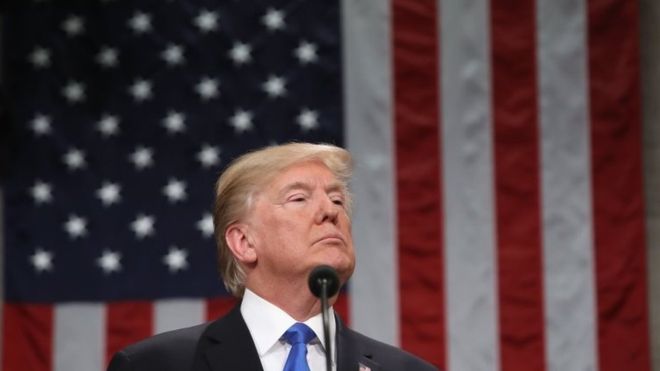AFP |
US President Donald Trump announced Tuesday he would keep Guantanamo Bay open, breaking from his predecessor Barack Obama’s lengthy and ultimately failed efforts to shutter the maligned detention facility.
“I just signed an order directing Secretary Mattis to reexamine our military detention policy and to keep open the detention facilities at Guantanamo Bay,” Trump said, in his State of the Union address to Congress, in keeping with a campaign promise.
Under president George W. Bush, the US military hastily constructed a prison camp on Guantanamo Bay, located on the US naval base on the eastern tip of Cuba, in the months following the US-led invasion of Afghanistan after the September 11, 2001 attacks.
The American Civil Liberties Union has taken up his case and a federal judge has ruled that the US must give it advance notice before transferring the man overseas. That would allow time for the ACLU to mount a legal challenge.
At first, inmates were held in cages and fenced in with razor wire, and conditions for the orange jumpsuit-clad detainees provoked a global outcry in 2002. That early facility, known as Camp X-Ray, was soon replaced with more permanent structures and today, Guantanamo Bay consists of numerous high-security prison buildings.
At the height of its operations after 9/11, the facility held 780 people, detained mostly for their alleged ties to Al-Qaeda and the Taliban. Since then, hundreds have been transferred back to their home countries or other places.
Read more: Where Even Nightmares Are Classified: Psychiatric Care at Guantánamo
Some of the most notorious inmates, including several alleged 9/11 co-conspirators, among them accused mastermind Khalid Sheikh Mohammed, are still awaiting trial. Their cases have been beset by legal woes at Guantanamo, where a bespoke criminal justice system grants detainees — who are considered “unprivileged enemy belligerents” — only some of the legal rights that US federal courts guarantee.
Another case that could potentially bring Guantanamo into legal focus is that of a US citizen who was captured in Syria and had allegedly been fighting for the Islamic State group. The man, whose name has not been released, is apparently being held in Iraq.
Of the 41 inmates remaining at Guantanamo, about 26 are trapped in legal purgatory. These so-called “forever prisoners” have never been charged — yet they have been deemed too dangerous to release. Some were cleared for release under Obama, but have been stranded at Guantanamo under the Trump administration.
Bad Dudes
On the campaign trail, Trump famously vowed he would load Guantanamo with “bad dudes,” and said it would be “fine” if US terror suspects were sent there for trial. In 2009, soon after he was sworn in, Obama ordered the prison to be closed within a year, and no new inmate has been sent there since early 2008.
Political bickering, vehement Republican opposition and foreign allies’ reluctance to take in the prisoners meant Obama could not close Guantanamo, though the population dropped from 242 to 41 under his watch.
At the height of its operations after 9/11, the facility held 780 people, detained mostly for their alleged ties to Al-Qaeda and the Taliban. Since then, hundreds have been transferred back to their home countries or other places.
Since becoming president, Trump has toyed with the idea of sending Americans to Guantanamo, though federal judges would likely bar any such attempt. In October, he suggested that the man accused of carrying out a deadly truck attack along a bike path in New York could be sent to Guantanamo, but he later backed off the idea.
Read more: Guantanamo Bay has ‘so much fun’ for deployed US Military
Another case that could potentially bring Guantanamo into legal focus is that of a US citizen who was captured in Syria and had allegedly been fighting for the Islamic State group. The man, whose name has not been released, is apparently being held in Iraq.
The American Civil Liberties Union has taken up his case and a federal judge has ruled that the US must give it advance notice before transferring the man overseas. That would allow time for the ACLU to mount a legal challenge.
© Agence France-Presse














